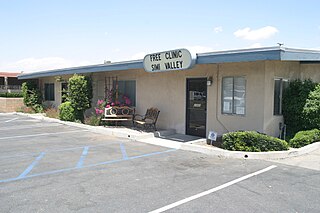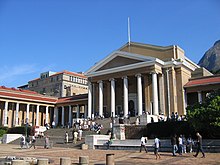
Stanford University Medical Center is a medical complex which includes Stanford Health Care and Stanford Children's Health. It is consistently ranked as one of the best hospitals in the United States and serves as a teaching hospital for the Stanford University School of Medicine. In 2022–23, it was ranked by the US News as the 3rd-best hospital in California and 10th-best in the country.

The University of Cape Town (UCT) is a public research university in Cape Town, South Africa. Established in 1829 as the South African College, it was granted full university status in 1918, making it the oldest university in South Africa and the oldest university in Sub-Saharan Africa in continuous operation.

A free clinic or walk in clinic is a health care facility in the United States offering services to economically disadvantaged individuals for free or at a nominal cost. The need for such a clinic arises in societies where there is no universal healthcare, and therefore a social safety net has arisen in its place. Core staff members may hold full-time paid positions, however, most of the staff a patient will encounter are volunteers drawn from the local medical community.

Mercy Ships is an international charity based on Christian values that operates the largest non-governmental hospital ships in the world, providing hope and healing in Africa through surgical care and surgical education, community development projects, community health education, mental health programs, agriculture projects, and palliative care for terminally ill patients. Its headquarters are in Garden Valley, Texas.

Khayelitsha is a township in Western Cape, South Africa, on the Cape Flats in the City of Cape Town Metropolitan Municipality. The name is Xhosa for New Home. It is reputed to be one of the largest and fastest-growing townships in South Africa.

Sankara Nethralaya is a non-profit missionary institution for ophthalmic care headquartered in Chennai, India. In the name "Sankara Nethralaya", "Sankara" is a reference to Lord Shiva and "Nethralaya" means "The Temple of the Eye". Sankara Nethralaya has over 1000 employees and serves around 1500 patients per day, performing over 100 surgeries daily. The annual revenue as per the taxes is close to US$100 million.

Observatory is a suburb in Cape Town, South Africa, colloquially known as Obs. Bordered by Mowbray to the south and Salt River to the northwest, the area is best known as a student neighbourhood associated with the nearby University of Cape Town and Groote Schuur Hospital. It takes its name from the South African Astronomical Observatory headquarters, built in 1829 by the Royal Observatory.
Max Price is a former vice-chancellor and principal of the University of Cape Town (UCT) in South Africa. He succeeded Njabulo Ndebele and held this position for 10 years from 19 August 2008 until 30 June 2018.

Bethesda Hospital is a multi-speciality hospital situated in Ambur in the south Indian state of Tamil Nadu. It serves the taluk and the adjoining areas of Ambur.
The public healthcare system in India evolved due to a number of influences since 1947, including British influence from the colonial period. The need for an efficient and effective public health system in India is large. Public health system across nations is a conglomeration of all organized activities that prevent disease, prolong life and promote health and efficiency of its people. Indian healthcare system has been historically dominated by provisioning of medical care and neglected public health. 11.9% of all maternal deaths and 18% of all infant mortality in the world occurs in India, ranking it the highest in the world. 36.6 out of 1000 children are dead by the time they reach the age of 5. 62% of children are immunized. Communicable disease is the cause of death for 53% of all deaths in India.
The Somali Red Crescent Society (SRCS) is a non-political, independent humanitarian organization in Somalia and is part of the International Red Cross and Red Crescent Movement.
Kabokweni is a town in Ehlanzeni District Municipality in the Mpumalanga province of South Africa. It was established formally as a town in 1967, as the first town in the Kangwane bantustan.
The Desmond Tutu TB Centre, also referred to as the DTTC or Desmond Tutu Tuberculosis Centre, is a research facility committed to raising awareness about tuberculosis and providing medical treatment and solutions to TB patients in South Africa. Founded in 2003 by Professor Nulda Beyers as the Centre for Tuberculosis Research and Education, the centre came under the patronage of Archbishop Desmond Tutu, Archbishop of South Africa and former TB survivor and, in 2005, changed its name to reflect the event. Since then, the DTTC has worked alongside Desmond Tutu to combat the health issue of TB in South Africa. It is currently directed by Professor Beyers.

EMMS International is a Non-governmental Organization (NGO) that provides medical aid to countries around the world and operates offices in the UK. Founded to provide clinical education and medical aid to people in need in Scotland, it later expanded to the Middle East, South Asia, and Africa through sponsoring the construction of dispensaries and hospitals. Its education expanded from training physicians in Edinburgh to training local nurses and physicians in the countries where it works. EMMS continues to provide resource assistance at all its sites. Based in Scotland, its vision is health for today, hope for tomorrow.

Cecilia Makiwane Hospital (CMH) is a large, provincial, government-funded hospital situated in the Mdantsane township near East London, Eastern Cape in South Africa. It is a tertiary teaching hospital and forms part of the East London Hospital Complex with Frere Hospital. It is named after Cecilia Makiwane, the first African woman to become a professional nurse in South Africa.
Madwaleni Hospital is a Provincial government funded hospital near rural Elliotdale, Eastern Cape in South Africa.
Frances Rix Ames was a South African neurologist, psychiatrist, and human rights activist, best known for leading the medical ethics inquiry into the death of anti-apartheid activist Steve Biko, who died from medical neglect after being tortured in police custody. When the South African Medical and Dental Council (SAMDC) declined to discipline the chief district surgeon and his assistant who treated Biko, Ames and a group of five academics and physicians raised funds and fought an eight-year legal battle against the medical establishment. Ames risked her personal safety and academic career in her pursuit of justice, taking the dispute to the South African Supreme Court, where she eventually won the case in 1985.
Zanempilo Community Health Care Centre (ZCHC), infamously known as the "Biko Clinic", was the first primary health care centre initiative outside of the public sector in South Africa. It is located in Zinyoka Village, near King William's Town in the Eastern Cape. The clinic was established as one of the Black Community Programmes (BCPs) spearheaded by Steve Biko and Mamphela Ramphele.

The Mayo Clinic Alix School of Medicine (MCASOM), formerly known as Mayo Medical School (MMS), is a research-oriented medical school based in Rochester, Minnesota, with additional campuses in Arizona and Florida. MCASOM is a school within the Mayo Clinic College of Medicine and Science (MCCMS), the education division of the Mayo Clinic. It grants the Doctor of Medicine (M.D.) degree, accredited by the Higher Learning Commission (HLC) and the Liaison Committee on Medical Education (LCME). In November 2018, the school was renamed in honor of a $200 million donation from businessman Jay Alix.
Golda Selzer (1910–1999) was an academic and pathologist at Groote Schuur Hospital, and co-founder of SHAWCO. Selzer published extensively with over 50 articles of which more than 15 were on poliomyelitis.













